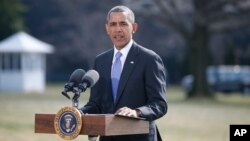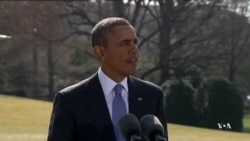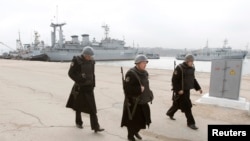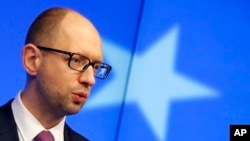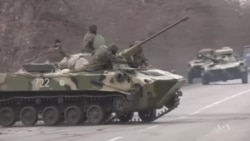U.S. President Barack Obama announced on Thursday morning a series of expanded sanctions against Russia over its annexation of the Crimean peninsula.
Speaking on the South Lawn of the White House before a trip to Florida, Obama said the U.S. will impose more sanctions on Russian government officials, including individuals tied to Russia's Crimea efforts, and Bank Rossiya, which handles financial transactions for many in the Russian leadership elite.
"Russia must know that further escalation will only isolate it further from the international community," Obama said, adding that sanctions will possibly be expanded to impact more areas of the Russian economy.
"Over the last several days, we've continued to be deeply concerned by events in Ukraine,'' Obama said, citing what he called an illegal referendum in Crimea, an illegitimate move to annex the territory Crimea, and "dangerous risks of escalation, including threats" to Ukraine. He cited threats Russia has made to the eastern and southern regions of Ukraine.
"These are all choices that the Russian government has made, choices that have been rejected by the international community as well as the government of Ukraine," Obama added.
Washington on Monday announced a first round of sanctions against eleven people, including seven Russians, it said were involved with the Crimean annexation.
In Brussels, meanwhile, European Union leaders added 12 people - all Russian or Crimean - to a list of those subject to travel bans and asset freezes. The new names were not immediately released, but the move raises the number of people subject to EU sanctions to 33.
Russia hits back
Almost immediately after Obama’s announcement, Russia retaliated with "reciprocal sanctions," warning the West it would hit back over “every hostile thrust.”
The sanctions, according to a Foreign Ministry statement, appear to be travel restrictions imposed on senior U.S. officials and lawmakers.
Among those barred from Russia are Deputy National Security Adviser Benjamin Rhodes, senators John McCain, Daniel Coats, Mary Landrieu, Robert Menendez and Harry Reid, as well as House Speaker John Boehner, the Foreign Ministry said.
Reacting to the sanctions, Menendez, who chairs the Senate Foreign Relations Committee, issued the following statement:
"[Russian] President [Vladimir] Putin's military invasion and annexation of Crimea is brutal, totally unacceptable, and sadly returns us to a period of Cold War aggression and hostility. It doesn't have to be this way, but if standing up for the Ukrainian people, their freedom, their hard earned democracy, and sovereignty means I'm sanctioned by Putin, so be it."
Separately, Russian Foreign Minister Sergei Lavrov told U.S. Secretary of State John Kerry that “the decision on the reunification of Crimea and Russia is not subject to review.”
EU mulls expanding sanctions
German Chancellor Angela Merkel told her nation's parliament Thursday the EU is prepared to move to "Level 3" measures, which would include economic sanctions, if the situation worsens.
The EU has already imposed travel bans and asset freezes on Russian officials deemed responsible for the incursion into Crimea.
Merkel said the Group of Eight forum of leading economies is effectively suspended as long as the diplomatic standoff with Russia continues. Russia has been part of the G-8, along with Britain, Canada, France, Germany, Italy, Japan and the United States.
Meanwhile, U.N. Secretary-General Ban Ki-moon said tensions between Ukraine and Russia pose “great risks to the countries themselves and beyond” and urged restraint by all parties.
Speaking after a meeting in Moscow with Russian President Vladimir Putin, Ban said he “emphasized that all parties [should] refrain from any hasty or provocative actions that could further exacerbate the already very tense and very volatile situation.”
On Friday, Ban is expected to meet with Ukrainian leaders in Kyiv.
Russian Duma approves Crimea annexation
Russia's lower house of parliament, the State Duma, on Thursday overwhelmingly approved a treaty to annex Crimea from Ukraine, taking the Black Sea peninsula a step closer to joining the Russian Federation.
The Federation Council, the upper house of Russia’s legislature, is expected to hold a similar vote on Friday, completing ratification of a treaty that President Vladimir Putin signed with Moscow-backed Crimean leaders Tuesday.
“I am certain the passage of these documents will be a turning point in the fate of the multi-ethnic peoples of Crimea and Russia, who are linked by the close ties of historical solidarity,” Foreign Minister Sergei Lavrov told the Duma after presenting the treaty to the chamber.
“The unification of these peoples in one state will promote the well-being and prosperity and serve the interests of Russia,” Lavrov added.
Earlier Thursday, Lavrov blamed the crisis on the West, without specifically mentioning the United States.
He said Western nations were trying to “preserve their global leadership and display their exceptionalism rather than striving to be guided by international law.”
Crimea, with an ethnic Russian majority, voted to break away from Ukraine and join Russia in a controversial referendum Sunday that the U.S. and European Union have declared illegal.
Ukraine PM warns of Russia’s designs
Russian President Vladimir Putin wants to destabilize Ukraine's presidential election in May and has been preparing for possible military action in eastern Ukraine, Prime Minister Arseniy Yatsenyuk said.
In an interview with Reuters, Yatsenyuk, 39, said Putin wants to extend his hold on Ukraine outside the Crimean peninsula into other areas where the majority of the country's Russian speakers live.
“We have clear proof and evidence [that] Russian agencies hired a number of so-called protesters - or actually gangsters - with the task to trigger another cycle of violence in southern and eastern Ukraine,” he said.
Such moves would be part of a plan by Putin, he said, to spark “provocations... and send his military to defend the Russian-speaking minority there.”
Putin has dismissed such suggestions.
Yatsenyuk said that to further undermine Ukraine, Putin will try to challenge the validity of the country's presidential election set for May 25.
Western governments hope that vote will help cement political change in Ukraine, but Yatsenyuk said Putin might try to trigger violent clashes to cast doubt on the result.
“Russia wants to cancel the presidential election, divide Ukraine, and the ultimate goal of Russia is to eliminate Ukrainian independence,” Yatsenyuk added.
Ukraine begins drawing back forces
Ukrainian border guards stationed in Crimea, now under the control of Russia's military, have started redeploying to regions on the mainland, a senior official said on Thursday.
Also about 1,000 civilians have so far left the peninsula, said Pavlo Shysholin, deputy head of the state border guard service, at a news conference.
Plans to evacuate Ukraine's outnumbered military personnel from the Crimean peninsula were announced yesterday by the country's security chief.
Andriy Parubiy - secretary of Ukraine's National Security and Defense Council - said Kyiv will seek United Nations support in turning the peninsula into a demilitarized zone. He also said Ukraine is planning to hold military maneuvers "with our allies," but did not elaborate.
Meanwhile, Russian Deputy Defense Minister Yuri Borisov said Thursday Moscow will bolster its "military infrastructure" in Crimea to ensure the peninsula is "a worthy representative of the Russian Federation" and "protected against all possible encroachments."
Russia is already handing out passports to Crimea residents.
EU cracks open door for Ukrainian goods
Influential European lawmakers backed a package of nearly 500 million euros ($695 million) in annual trade benefits for Ukraine Thursday, opening the way for duty-free Ukrainian exports into EU countries beginning late April.
Brussels is giving Ukraine unfettered access to the 28-nation bloc's 500 million consumers even before a proposed bilateral free-trade accord comes into force later this year to cement Kyiv's historic shift away from Russia.
The deal was approved by the European Parliament's International Trade Committee. The full European Parliament is due to sign off on the EU's unilateral measures in mid-April.
The move is as an important step to revive the EU-Ukraine Association Agreement which ousted president Viktor Yanukovych rejected in November in favor of financial backing from Moscow.
EU leaders and Ukraine's prime minister are expected sign the political part of the agreement at a two-day summit in Brussels beginning Thursday.
Some reporting by Reuters
Speaking on the South Lawn of the White House before a trip to Florida, Obama said the U.S. will impose more sanctions on Russian government officials, including individuals tied to Russia's Crimea efforts, and Bank Rossiya, which handles financial transactions for many in the Russian leadership elite.
"Russia must know that further escalation will only isolate it further from the international community," Obama said, adding that sanctions will possibly be expanded to impact more areas of the Russian economy.
"Over the last several days, we've continued to be deeply concerned by events in Ukraine,'' Obama said, citing what he called an illegal referendum in Crimea, an illegitimate move to annex the territory Crimea, and "dangerous risks of escalation, including threats" to Ukraine. He cited threats Russia has made to the eastern and southern regions of Ukraine.
"These are all choices that the Russian government has made, choices that have been rejected by the international community as well as the government of Ukraine," Obama added.
Washington on Monday announced a first round of sanctions against eleven people, including seven Russians, it said were involved with the Crimean annexation.
In Brussels, meanwhile, European Union leaders added 12 people - all Russian or Crimean - to a list of those subject to travel bans and asset freezes. The new names were not immediately released, but the move raises the number of people subject to EU sanctions to 33.
Russia hits back
Almost immediately after Obama’s announcement, Russia retaliated with "reciprocal sanctions," warning the West it would hit back over “every hostile thrust.”
The sanctions, according to a Foreign Ministry statement, appear to be travel restrictions imposed on senior U.S. officials and lawmakers.
Among those barred from Russia are Deputy National Security Adviser Benjamin Rhodes, senators John McCain, Daniel Coats, Mary Landrieu, Robert Menendez and Harry Reid, as well as House Speaker John Boehner, the Foreign Ministry said.
Reacting to the sanctions, Menendez, who chairs the Senate Foreign Relations Committee, issued the following statement:
"[Russian] President [Vladimir] Putin's military invasion and annexation of Crimea is brutal, totally unacceptable, and sadly returns us to a period of Cold War aggression and hostility. It doesn't have to be this way, but if standing up for the Ukrainian people, their freedom, their hard earned democracy, and sovereignty means I'm sanctioned by Putin, so be it."
Separately, Russian Foreign Minister Sergei Lavrov told U.S. Secretary of State John Kerry that “the decision on the reunification of Crimea and Russia is not subject to review.”
EU mulls expanding sanctions
German Chancellor Angela Merkel told her nation's parliament Thursday the EU is prepared to move to "Level 3" measures, which would include economic sanctions, if the situation worsens.
The EU has already imposed travel bans and asset freezes on Russian officials deemed responsible for the incursion into Crimea.
Merkel said the Group of Eight forum of leading economies is effectively suspended as long as the diplomatic standoff with Russia continues. Russia has been part of the G-8, along with Britain, Canada, France, Germany, Italy, Japan and the United States.
Meanwhile, U.N. Secretary-General Ban Ki-moon said tensions between Ukraine and Russia pose “great risks to the countries themselves and beyond” and urged restraint by all parties.
Speaking after a meeting in Moscow with Russian President Vladimir Putin, Ban said he “emphasized that all parties [should] refrain from any hasty or provocative actions that could further exacerbate the already very tense and very volatile situation.”
On Friday, Ban is expected to meet with Ukrainian leaders in Kyiv.
Russian Duma approves Crimea annexation
Russia's lower house of parliament, the State Duma, on Thursday overwhelmingly approved a treaty to annex Crimea from Ukraine, taking the Black Sea peninsula a step closer to joining the Russian Federation.
The Federation Council, the upper house of Russia’s legislature, is expected to hold a similar vote on Friday, completing ratification of a treaty that President Vladimir Putin signed with Moscow-backed Crimean leaders Tuesday.
“I am certain the passage of these documents will be a turning point in the fate of the multi-ethnic peoples of Crimea and Russia, who are linked by the close ties of historical solidarity,” Foreign Minister Sergei Lavrov told the Duma after presenting the treaty to the chamber.
“The unification of these peoples in one state will promote the well-being and prosperity and serve the interests of Russia,” Lavrov added.
Earlier Thursday, Lavrov blamed the crisis on the West, without specifically mentioning the United States.
He said Western nations were trying to “preserve their global leadership and display their exceptionalism rather than striving to be guided by international law.”
Crimea, with an ethnic Russian majority, voted to break away from Ukraine and join Russia in a controversial referendum Sunday that the U.S. and European Union have declared illegal.
Ukraine PM warns of Russia’s designs
Russian President Vladimir Putin wants to destabilize Ukraine's presidential election in May and has been preparing for possible military action in eastern Ukraine, Prime Minister Arseniy Yatsenyuk said.
In an interview with Reuters, Yatsenyuk, 39, said Putin wants to extend his hold on Ukraine outside the Crimean peninsula into other areas where the majority of the country's Russian speakers live.
“We have clear proof and evidence [that] Russian agencies hired a number of so-called protesters - or actually gangsters - with the task to trigger another cycle of violence in southern and eastern Ukraine,” he said.
Such moves would be part of a plan by Putin, he said, to spark “provocations... and send his military to defend the Russian-speaking minority there.”
Putin has dismissed such suggestions.
Yatsenyuk said that to further undermine Ukraine, Putin will try to challenge the validity of the country's presidential election set for May 25.
Western governments hope that vote will help cement political change in Ukraine, but Yatsenyuk said Putin might try to trigger violent clashes to cast doubt on the result.
“Russia wants to cancel the presidential election, divide Ukraine, and the ultimate goal of Russia is to eliminate Ukrainian independence,” Yatsenyuk added.
Ukraine begins drawing back forces
Ukrainian border guards stationed in Crimea, now under the control of Russia's military, have started redeploying to regions on the mainland, a senior official said on Thursday.
Also about 1,000 civilians have so far left the peninsula, said Pavlo Shysholin, deputy head of the state border guard service, at a news conference.
Plans to evacuate Ukraine's outnumbered military personnel from the Crimean peninsula were announced yesterday by the country's security chief.
Andriy Parubiy - secretary of Ukraine's National Security and Defense Council - said Kyiv will seek United Nations support in turning the peninsula into a demilitarized zone. He also said Ukraine is planning to hold military maneuvers "with our allies," but did not elaborate.
Meanwhile, Russian Deputy Defense Minister Yuri Borisov said Thursday Moscow will bolster its "military infrastructure" in Crimea to ensure the peninsula is "a worthy representative of the Russian Federation" and "protected against all possible encroachments."
Russia is already handing out passports to Crimea residents.
EU cracks open door for Ukrainian goods
Influential European lawmakers backed a package of nearly 500 million euros ($695 million) in annual trade benefits for Ukraine Thursday, opening the way for duty-free Ukrainian exports into EU countries beginning late April.
Brussels is giving Ukraine unfettered access to the 28-nation bloc's 500 million consumers even before a proposed bilateral free-trade accord comes into force later this year to cement Kyiv's historic shift away from Russia.
The deal was approved by the European Parliament's International Trade Committee. The full European Parliament is due to sign off on the EU's unilateral measures in mid-April.
The move is as an important step to revive the EU-Ukraine Association Agreement which ousted president Viktor Yanukovych rejected in November in favor of financial backing from Moscow.
EU leaders and Ukraine's prime minister are expected sign the political part of the agreement at a two-day summit in Brussels beginning Thursday.
Some reporting by Reuters




